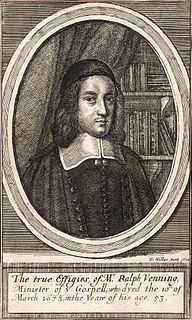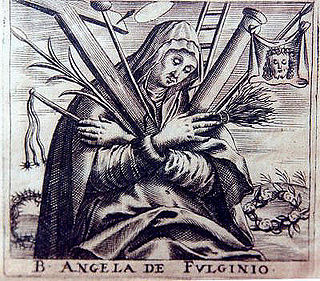A Quote by Teresa of Avila
The saints rejoiced at injuries and persecutions, because in forgiving them they had something to present to God when they prayed to Him.
Related Quotes
Remember when you got into the word and it wasn’t because you had a sermon to prepare or you needed to learn some things or there were some doctrinal problems or you knew that to progress as a useful servant you had to continue on in the things of the word of God? Do you remember when you just got into the word because you wanted to hear something from God? You wanted to know something about Him. Do you remember when you just prayed because of Him? Is your heart burning for Him?
The early Christians made it a part of their religion to look for His return. Backward they looked to the cross and the atonement for sin, and rejoiced in Christ crucified. Upward they looked to Christ at the right hand of God, and rejoiced in Christ interceding. Forward they looked to the promised return of their Master, and rejoiced in the thought that they would see Him again. And we ought to do the same.
What is forgiving? Forgiving is giving up all claim on one who had hurt you and letting go of the emotional consequences of the hurt. How can we do that? It's done at the price of beating back our pride. By nature we are selfish. Forgiving, by definition, is unselfish. Being hurt by another person wounds our pride. Pride stands in the way of forgiving. We cannot forgive without God's help. It might be possible for us to forgive something inconsequential without God's help; but in significant matters, we are unlikely to accomplish anything without God's involvement in the process.
Having spent time around "sinners" and also around purported saints, I have a hunch why Jesus spent so much time with the former group: I think he preferred their company. Because the sinners were honest about themselves and had no pretense, Jesus could deal with them. In contrast, the saints put on airs, judged him, and sought to catch him in a moral trap. In the end it was the saints, not the sinners, who arrested Jesus.
Although we tend to think about saints as holy and pious, and picture them with halos above their heads and ecstatic gazes, true saints are much more accessible. They are men and women like us, who live ordinary lives and struggle with ordinary problems. What makes them saints is their clear and unwavering focus on God and God's people.
"If a man finds it very hard to forgive injuries, let him look at a Crucifix, and think that Christ shed all His Blood for him, and not only forgave His enemies, but even prayed His Heavenly Father to forgive them also. Let him remember that when he says the Pater Noster, every day, instead of asking pardon for his sins, he is calling down vengeance on himself."
The saints should always remember that God sees not as man sees; that he does not willingly afflict his children, and that if he requires them to endure present privation and trial, it is that they may escape greater tribulations which would otherwise inevitably overtake them. If He deprives them of any present blessing, it is that he may bestow upon them greater and more glorious ones by-and by.
Her first reaction was one of hope, because his eyes were open and shining with a radiant light she had never seen there before. She prayed to God to give him at least a moment so that he would not go without knowing how much she had love him despite all their doubts, and she felt an irresistible longing to begin life with him over again so that they could say what they had left unsaid and do everything right that they had done badly in the past. But she had to give in to the intransigence of death. (Love in the Time of Cholera)
In that time and by God's will there died my mother, who was a great hindrance unto me in following the way of God; my husband died likewise, and in a short time there also died all my children. And because I had commenced to follow the aforesaid way and had prayed God that He would rid me of them, I had great consolation of their deaths, albeit I did also feel some grief.
Never prayed to God, I prayed to Gotti, that's right it's wicked, that's life I live it. Ain't askin' for forgiveness for my sins. I gotta get my soul right, I gotta get these Devils out my life. Lord forgive him, He got them dark forces in. connected to the high power. 666. I can introduce you to evil.










































